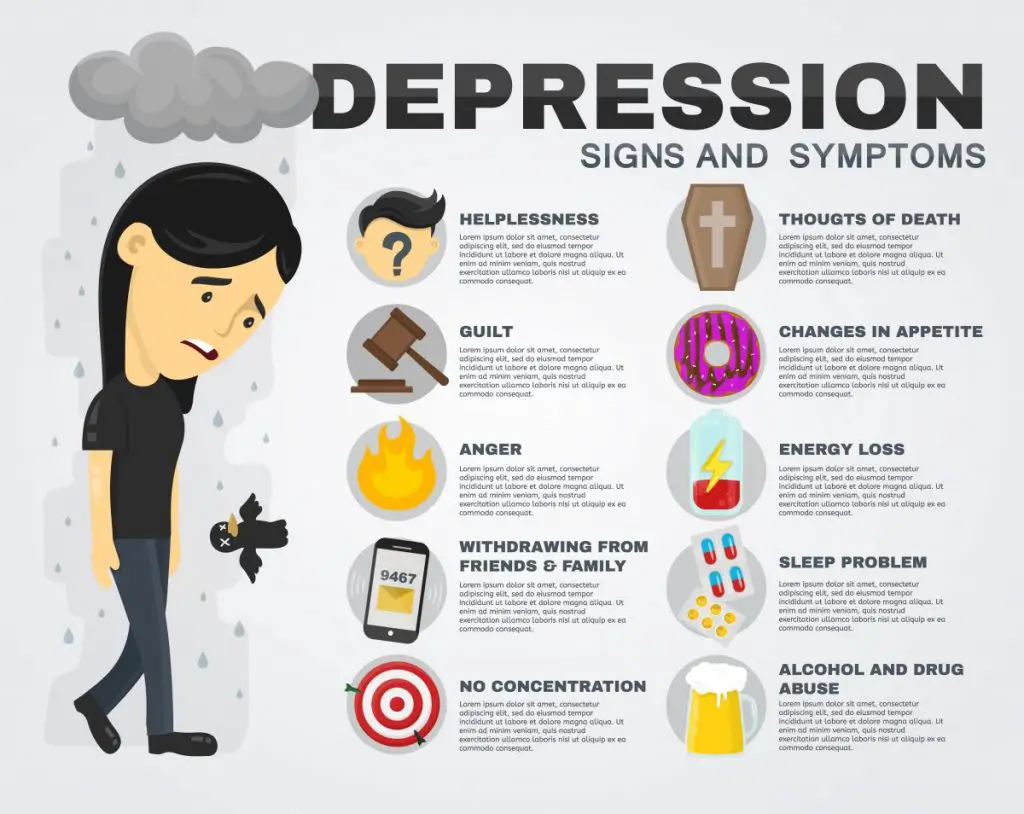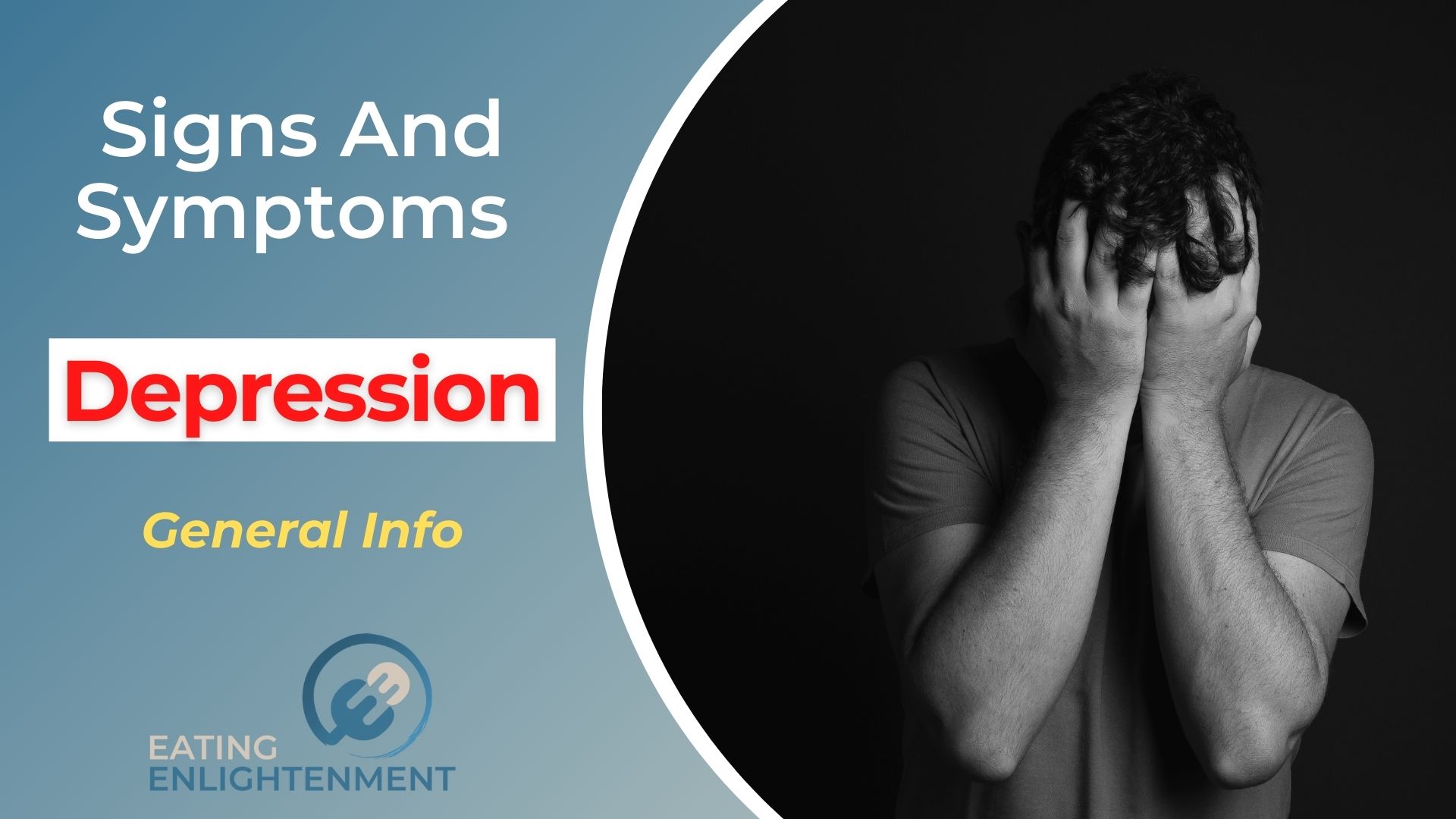As a society, we have become more aware of our mental health. We are in a new age of mental awareness, and recognize that burying our feelings and “getting on with it” isn’t and has never been a helpful suggestion.
Mental disorders can dramatically harm our lives, and should be treated as seriously as physical conditions.
But knowing the difference between general sadness, continuous low mood, mild depression, and a genuine mood disorder can be hard. At what point should we ask for help, and is everyone else feeling the same way?
Today, we will help you navigate your mental health, by explaining the signs and symptoms to look out for.
What Is Depression?
Having negative feelings is a normal part of life. Feeling hopeless after yet another job rejection or dreading exam season is a natural reaction to a stressful and upsetting situation. However, when these feelings don’t go away, or if you cannot complete your daily activities because of them, then your mental health might be deteriorating.
When someone is depressed, they change their behaviors and struggle to get through typical daily activities such as having a shower, eating, or enjoying a once loved hobby. If you can’t put your feelings to one side and take a break from the negativity in your life, then something might be wrong.
What Causes Depression?
Many factors can trigger depression, but most can be traced back to these 3 causes – situational, brain chemistry, and hormone differences.
Situational depression occurs during a major life changes. If you move from one location to the next, leave friends and familiarity behind, and realize that you don’t “fit in” with the new area, depression symptoms can quickly develop.
In this example, a change in situation has affected your mental health. Talking to a mental health professional can be enough to help treat depression.
Depression related to brain chemistry is harder to rationalize. This type of mental illness is affected by your brain’s ability to control your mood. It is a persistent depressive disorder.
Without an obvious trigger, people with this type of depression often need antidepressant medicines, supplements for depression, or other prescription medicine to balance their mood disorders.
When a person’s body changes, their hormones can become unbalanced. This is most commonly found in teenagers and pregnant people, as a person’s body grows and adapts to a biological life change.
Postpartum depression and perinatal depression are often a double-bladed sword. As the parent developing depression battles with their new negative feelings about their baby, and then has to cope with guilt for having these feelings. This can lead into a spiral of depressive disorders.
How To Recognize Signs And Symptoms Of Depression

When we look at the signs of depression, we are searching for the personality changes in a family member or ourselves. Severe depression often shows these signs more dramatically than someone with moderate depression, but lots of people who suffer from these mental disorders hide their feelings in an attempt to protect themselves.
If you notice these warning signs of depression, then you should consider seeking help from a mental health professional.
1 – Hopelessness
Hopelessness can come in many forms such as low self esteem, low mood, self-hate, constant guilt, and more. The idea that there is “no way out” is a common sign of a major depressive disorder.
2 – Lack Of Interest
If you or a loved one lose interest in an activity that you once enjoyed, then you may be experiencing depression. Our interests change over time and if you lose interest in one activity, but gain interest in another, then your taste may have simply changed.
But if nothing gets you excited or looking forward to the future, then you may be experiencing major depression. Please contact Mental Health America to find help.
3 – Irritability
Often as a reaction to their own feelings, those who refuse to believe they are depressed often blame others for their negativity. This results in irritability, anger, and substance abuse. Some turn to drug abuse to escape reality. Either way, an attachment to drugs is often used in unhealthy coping strategies.
Understanding Signs And Symptoms Of Depression
Moving away from the social signs of depression, we will now focus on the biological effects of depression.
4 – Lack Of Concentration
An inability to focus on something or an inability to remember details about a topic, is a common depression symptom. This is due to the stress response which releases the hormone cortisol. The hormone alters your brain chemistry, affecting your memory. Your brain is trying to save you from dealing with extra details as you cope with your mental health, so it switches you off mentality.
5 – Unexplained Aches
Your brain’s neurotransmitters are the mechanical control center for your pain and mood. They deal out serotonin and norepinephrine hormones to regulate pain and happiness.
When someone is experiencing depression symptoms, their hormones become imbalanced. This causes less serotonin and norepinephrine in your brain, which creates incorrect signals from your neurotransmitters.
This means your body thinks you have physical illnesses and signs pain signals to help you slow down. With severe symptoms such as these, brain stimulation treatments can help combat the hormonal imbalance.
6 – Appetite Changes
As a person’s hormone changes, their body stops telling them when they need to eat. This can lead to appetite loss.
However, many people resort to eating when they are unhappy. They see this as an activity they can complete, and hope to receive some happy hormones such as endorphins when they digest the food they like.
In a desperate attempt to receive more of these happy hormones, they eat more than they need to and suffer from weight gain.
When To See A Doctor for Signs And Symptoms Of Depression
If you feel like you need help, you cannot complete your daily tasks, or you’re thinking of self harm, then it’s time to speak to a doctor.
Do not wait until suicidal thoughts start to enter your mind. Look after your mind like you would look after your body. If something isn’t right, seek treatment before it becomes a larger issue.
There are websites such as https://www.withpower.com/ that can help you find new treatments to try. Or you can call the National Suicide Prevention Lifeline at 1-800-273-TALK (1-800-273-8255).
Summary – Signs And Symptoms Of Depression
There are many different types of mental health disorders, such as bipolar disorder, clinical depression, seasonal affective disorder, and premenstrual dysphoric disorder. You don’t need to know which one you are suffering with to understand that you need help.
If you or a loved one has emotional and physical problems, a mental health professional can help you understand your depression symptoms, diagnose your medical condition, teach you depression basics and offer you interpersonal therapy.
You may also want to look at supplements for brain function.


